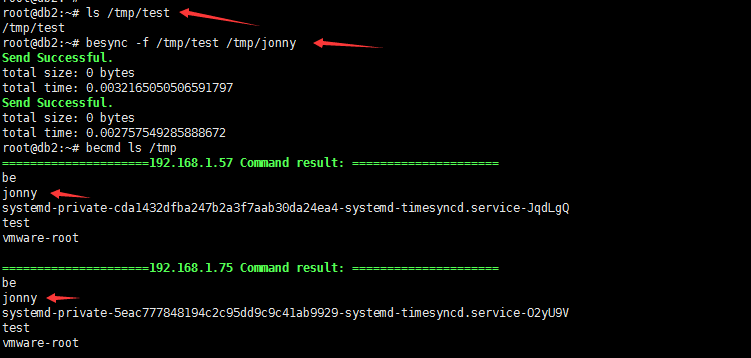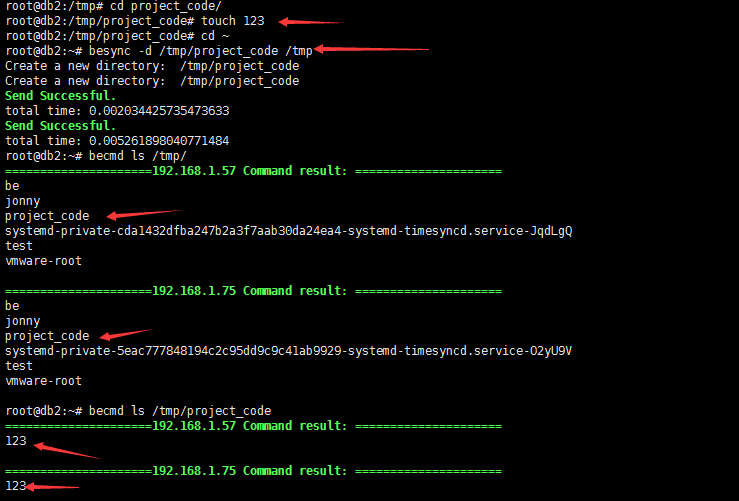首页 > 代码库 > python paramiko 多线程批量执行指令及批量上传文件和目录
python paramiko 多线程批量执行指令及批量上传文件和目录
源代码:
https://github.com/jy1779/be.git
环境需求:
1、python3
2、paramiko
pip install --upgrade pip
apt-get install libssl-dev
pip3 install paramiko
3、执行权限
chmod +x becmd.py
ln -s /root/be/bin/becmd.py /usr/local/sbin/becmd
chmod +x besync.py
ln -s /root/be/bin/becmd.py /usr/local/sbin/besync
4、导入路径设置
cd /usr/lib/python3.5/dist-packages/
touch be.pth
vim be.pth
/root/be #be.pth文件内容
5、因为是从windows开发所以会出现以下问题:
windows 上传的文件,可以用这个指令格式化成Unix文件。
apt install dos2unix
root@db3:~/be/bin# ./besync.py
/usr/bin/env: ‘python3\r’: No such file or directory
root@db3:~/be/bin# dos2unix besync.py
dos2unix: converting file besync.py to Unix format ...
root@db3:~/be/bin# ./besync.py
Reminder: The source and destination addresses do not exist
Usage: ./besync.py <source address> <destination address>
解决
apt install dos2unix
dos2unix becmd.py
dos2unix besync.py
6、日志路径的问题。最好是绝对路径,不然只能在be目录下执行becmd 和besync
f = open("/root/be/logs/besync.log",‘a‘)
f = open("/root/be/logs/becmd.log",‘a‘)
程序目录:
.
├── app
│ ├── __init__.py
│ ├── pwd_connect_cmd.py
│ ├── pwd_connect_sync.py
│ ├── __pycache__
│ │ ├── __init__.cpython-35.pyc
│ │ ├── pwd_connect_cmd.cpython-35.pyc
│ │ ├── pwd_connect_sync.cpython-35.pyc
│ │ ├── ssh_be_cmd.cpython-35.pyc
│ │ └── ssh_be_sync.cpython-35.pyc
│ ├── ssh_be_cmd.py
│ └── ssh_be_sync.py
├── bin
│ ├── becmd.py
│ ├── besync.py
│ └── __init__.py
├── conf
│ ├── config.py
│ ├── __init__.py
│ └── __pycache__
│ ├── config.cpython-35.pyc
│ └── __init__.cpython-35.pyc
├── __init__.py
└── logs
├── becmd.log
├── besync.log
└── __init__.py
app/ssh_be_cmd.py
import paramiko
import threading
import datetime
class MyThread(threading.Thread):
def __init__(self,ip,port,username,password,cmd):
self.ssh = paramiko.SSHClient()
self.ssh.set_missing_host_key_policy(paramiko.AutoAddPolicy())
super(MyThread,self).__init__()
self.ip = ip
self.port = port
self.username = username
self.password = password
self.cmd = cmd
def run(self):
port = int(self.port)
self.ssh.connect(hostname=self.ip, port=port, username=self.username, password=self.password)
stdin, stdout, stderr = self.ssh.exec_command(self.cmd)
res, err = stdout.read(), stderr.read()
result = res if res else err
f = open("/root/be/logs/becmd.log",‘a‘)
f.write(str(datetime.datetime.now())+" ")
f.write(self.ip+" ")
f.write(self.username+ " ")
f.write(self.cmd+ "\n")
f.close()
print("\033[1;32;40m" + self.ip.rjust(33,‘=‘)+ "\033[0m","\033[1;32;40m" + "Command result: ".ljust(37,‘=‘)+ "\033[0m")
print(result.decode())
self.ssh.close()app/pwd_connect_cmd.py
import sys
from app.ssh_be_cmd import MyThread
from conf.config import account
def pwd_con(host):
ip = account[host]["ip"]
port = account[host]["port"]
username = account[host]["username"]
password = account[host]["password"]
a=sys.argv[1:100]
cmd = " ".join(a)
if len(a) >=1:
M = MyThread(ip,port,username,password,cmd)
M.start()
else:
print("Reminder: The command does not exist")
exit()
def connect():
for host in account.keys():
pwd_con(host)app/ssh_be_sync.py
import paramiko
import threading
import datetime,time
import os
from os.path import getsize
class MyThread(threading.Thread):
def __init__(self,ip,port,username,password,cmd):
super(MyThread,self).__init__()
self.ip = ip
self.port = port
self.username = username
self.password = password
self.cmd = cmd
def run(self):
port = int(self.port)
self.transport = paramiko.Transport((self.ip, port))
self.transport.connect(username=self.username, password=self.password)
self.sftp = paramiko.SFTPClient.from_transport(self.transport)
help="""
-f send file to remote host.
%s -f <source address> <destination address>
-d send dir to remote host.
%s -d <source address> <destination address>
--help show help.
%s --help
"""%(self.cmd[0],self.cmd[0],self.cmd[0])
def create_remote_dir(dir):
for item in dir:
try:
self.sftp.stat(item)
pass
except FileNotFoundError:
print("Create a new directory: ", item)
self.sftp.mkdir(item)
def besync_log():
f = open("/root/be/logs/besync.log",‘a‘)
for i in str(datetime.datetime.now())+" ",self.ip+" ",self.username+ " ",self.cmd[0]+" ",self.cmd[1]+" ",src+" ",des+ "\n":
f.write(i)
f.close()
if len(self.cmd) == 4 and self.cmd[1] == "-f":
src = self.cmd[2]
des = self.cmd[3]
besync_log()
time_start = time.time()
if os.path.isfile(src):
des_list = des.split("/")
des_dir = des_list[1:-1]
b=""
c=[]
for item in des_dir:
b+="/"+item
c.append(b)
create_remote_dir(c)
self.sftp.put(src, des)
total_time = time.time() - time_start
print("\033[1;32;40mSend Successful.\033[0m")
print("total size: " + str(getsize(src)) + " bytes")
print("total time: " + str(total_time))
self.transport.close()
elif len(self.cmd) == 4 and self.cmd[1] == "-d":
def for_dir():
for res in path:
if os.path.isdir(res):
local_dir_path.append(res)
remote_dir_path.append(des)
def for_zdir():
des_src_dir.append(remote_dir_path[1])
des_src_dir_list = des_src_dir[0].split("/")
des_dir_list = des_src_dir_list[1:]
c = ""
remote_des_src_path = []
for item in des_dir_list:
c += "/" + item
remote_des_src_path.append(c)
create_remote_dir(remote_des_src_path)
create_remote_dir(remote_dir_path)
for res in path:
if os.path.isfile(res):
local_file_path.append(res)
src = self.cmd[2]
des = self.cmd[3]
besync_log()
sep = "/"
path = []
local_dir_path = []
local_file_path = []
remote_dir_path = []
remote_file_path = []
des_src_dir = []
for i in os.listdir(src):
path.append(src + sep + i)
for n in path:
if os.path.isdir(n) and os.listdir(n):
for i in os.listdir(n):
path.append(n + sep + i)
local_dir_path.append(src)
local_dir = src.split("/")
local_dir_first = local_dir[0:-1]
global a
if len(local_dir_first) == 0:
for_dir()
for res in local_dir_path:
remote_dir_path.append(des + "/" + res)
for_zdir()
for res in local_file_path:
remote_file_path.append(des + "/" + res)
else:
if len(local_dir_first) ==1:
dir_join="/".join(local_dir_first)
a=dir_join
else:
dir_join="/".join(local_dir_first)
a=dir_join+"/"
for res in path:
if os.path.isdir(res):
local_dir_path.append(res)
remote_dir_path.append(des)
b=[item.split(a)[-1] for item in local_dir_path]
for res in b:
if len(local_dir_first) ==1:
remote_dir_path.append(des + res)
else:
remote_dir_path.append(des + "/" + res)
for_zdir()
d = [item.split(a)[-1] for item in local_file_path]
for res in d:
if len(local_dir_first) ==1:
remote_file_path.append(des + res)
else:
remote_file_path.append(des + "/" + res)
time_start = time.time()
local_file_num = len(local_file_path)
for i in range(local_file_num):
self.sftp.put(local_file_path[i],remote_file_path[i])
total_time = time.time() - time_start
print("\033[1;32;40mSend Successful.\033[0m")
print("total time: " + str(total_time))
self.transport.close()
else:
print(help)app/pwd_connect_sync.py
import sys from app.ssh_be_sync import MyThread from conf.config import account def pwd_con(host): ip = account[host]["ip"] port = account[host]["port"] username = account[host]["username"] password = account[host]["password"] cmd=sys.argv[0:100] M = MyThread(ip, port, username, password, cmd) M.start() def connect(): for host in account.keys(): pwd_con(host)
conf/config.py
account = {
"192.168.1.57":{
"ip":"192.168.1.57",
"port":"22",
"username":"root",
"password":"123456"
},
"192.168.1.75":{
"ip": "192.168.1.75",
"port": "22",
"username": "root",
"password": "123456"
}
}bin/becmd.py
#!/usr/bin/env python3 from app.pwd_connect_cmd import connect connect()
bin/besync.py
#!/usr/bin/env python3 from app.pwd_connect_sync import connect connect()
使用例子:
1、批量执行指令:

2、批量上传文件

3、批量上传目录

本文出自 “微风清凉” 博客,谢绝转载!
python paramiko 多线程批量执行指令及批量上传文件和目录
